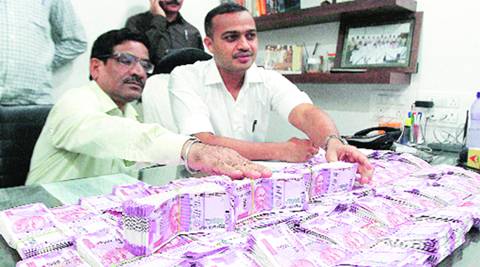The government has detected undisclosed income worth Rs 5,400 crore until January 10 after demonetisation, ET Now reported quoting a wire agency news which cited the Minister of State for Finance.
Tax authorities have seized assets worth more than Rs 610 crore between November 9 and January 10, the report added citing the minister but without identifying him. Finance Ministry has two ministers of state – Santosh Kumar Gangwar and Arjun Ram Meghwal.
Prime Minister Narendra Modi, in a surprise move on November 8, demonetised high-value currency notes in order to curb the menace of black money, sucking out 86% of cash currency in circulation in the country. The total value of the demonetised Rs-1000 and Rs-500 notes was at Rs 14.6 lakh crore.
Huge cash deposits in banks followed, as people queued up to trade in their old worthless notes with the new ones being issued by the government, leaving a trail in many cases for tax authorities to investigate suspicious inflows.
The minister in the ET Now news report said that the tax authorities have sent more than 5,100 notices to probe high cash deposits.
You may also like to watch:
[jwplayer YP3AX7gx]
Income tax collections have risen because of increased disclosures in December, following demonetisation, the Economic Survey for the year 2016-17 said earlier this week.
Earlier last month, RBI Governor Urjit Patel had said that the central bank had issued new currency notes worth Rs 9.2 lakh crore.
The Economic Survey 2016-17 forecast a temporary dip in real GDP growth at 0.25-0.5 percentage points relative to the baseline on the back of short term pain inflicted by demonetisation. The growth would come back towards its trend in the next financial year 2017-18, the survey added.
“Demonetisation has had short-term costs but holds the potential for long-term benefits,” Chief Economic Adviser Arvind Subramanian said after the Economic Survey was tabled in the Parliament.
India’s GDP growth is understood to have slowed through December, as demonetisation reduced demand, supply, liquidity and working capital, and increased uncertainty, among the short-term effects of the note-ban exercise. However, it “could be beneficial in the long run if formalisation increases and corruption falls”, the survey document said.
A slew of growth forecast cuts by various multilateral institutions and rating agencies had followed the demonetisation, all projecting a major blow to the economy in the wake of unavailability of cash to carry out any economic activity.


